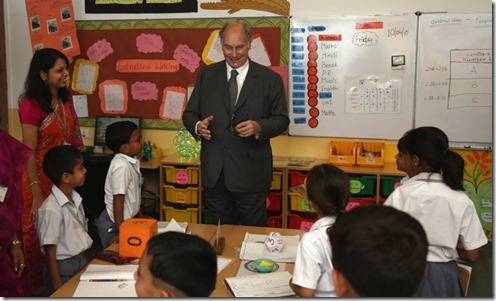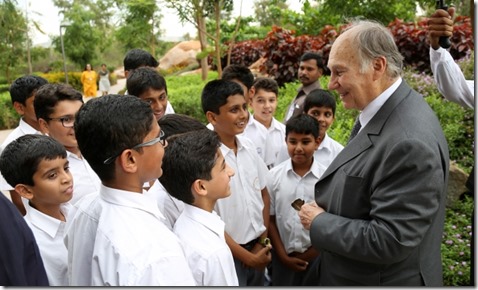The world recently mourned the passing of an extraordinary leader, His Highness Prince Karim Aga Khan IV, at the age of 88 in Lisbon, Portugal. As the 49th hereditary Imam of the Ismaili Muslim community, he dedicated his life to advancing human development, particularly through education, healthcare, and cultural preservation, under the Aga Khan Development Network (AKDN). Among his many impactful initiatives, Aga Khan IV emphasized the transformative power of education, with a particular focus on early childhood education (ECE) as the foundation for lifelong learning and holistic development.
This article explores the philosophy, contributions, and global influence of Aga Khan IV in championing early childhood education as an essential pillar of societal progress and individual growth.
Table of Contents
Aga Khan IV’s Philosophy on Education
Aga Khan IV firmly believed that education was more than a transfer of knowledge—it was a pathway to fostering ethical values, cultural understanding, and human dignity. His speeches and initiatives consistently reflected the view that education must prepare individuals to face modern societal challenges while remaining grounded in cultural and ethical traditions.
In his own words, “An education must equip students with the tools that allow them to adapt to our rapidly changing world while embracing a sense of social responsibility.” This philosophy guided his efforts in designing educational programs that combined academic rigor with an emphasis on ethics and pluralism.

Aga Khan IV was also a vocal advocate for inclusivity and diversity in education. He once stated, “Pluralism is not simply a positive characteristic of society; it is essential for human survival.” This belief underscored his commitment to creating educational systems that celebrated diversity, encouraged critical thinking, and nurtured holistic development from an early age.
The Importance of Early Childhood Education in Holistic Development
Early childhood education (ECE) has been proven to shape an individual’s physical, cognitive, and emotional development. Aga Khan IV’s emphasis on ECE stemmed from a recognition of its profound impact on human potential. He frequently highlighted that early investments in children yield long-term societal benefits, such as reduced inequality and improved community health.
1. Cognitive Development
Research shows that the first five years of life are critical for brain development. High-quality ECE fosters language acquisition, problem-solving skills, and critical thinking. Through interactive learning environments, children are given the tools to explore, question, and understand the world around them.
Aga Khan IV’s philosophy aligned closely with this scientific evidence. He believed that ECE programs should nurture curiosity and independent thought, encouraging children to engage with their surroundings in meaningful ways. This approach not only builds cognitive skills but also lays the groundwork for lifelong learning.
2. Emotional and Social Growth
Aga Khan IV often stressed the importance of emotional intelligence in education. Early childhood programs that incorporate social-emotional learning teach children to manage their emotions, empathize with others, and develop healthy relationships. These skills are critical for navigating an increasingly interconnected and pluralistic world.
“The purpose of education,” he once said, “is to provide students with the tools and confidence to build a peaceful and harmonious society.” His vision for ECE included creating safe, nurturing environments where children could learn not only academic subjects but also values such as respect, kindness, and tolerance.
3. Physical Development and Well-being

A holistic approach to ECE includes attention to a child’s physical health and well-being. Aga Khan IV emphasized the need for integrating health and nutrition services into early education programs, particularly in underserved communities. By addressing physical needs alongside cognitive and emotional development, these programs ensure that children are well-prepared for the challenges of adolescence and adulthood.
Aga Khan Development Network’s Contributions to Early Childhood Education
Under the leadership of Aga Khan IV, the Aga Khan Development Network (AKDN) has become a global leader in promoting early childhood education. Operating in over 30 countries, the AKDN works to improve access to quality education, especially in marginalized communities. Its initiatives in early childhood development have been transformative, providing children with the resources and support needed to thrive.
1. Establishment of Early Childhood Development (ECD) Centers
The AKDN has established numerous ECD centers worldwide, particularly in regions with limited access to formal education. These centers offer age-appropriate learning environments where children can explore their potential in a safe and supportive setting.
For example, in East Africa, the AKDN operates ECD programs that serve as models of excellence. These programs emphasize play-based learning, parental involvement, and cultural sensitivity, ensuring that children receive a well-rounded education that respects their unique contexts.
2. Teacher Training and Professional Development
Recognizing that teachers are the backbone of any educational system, Aga Khan IV prioritized investments in teacher training. Through initiatives like the Aga Khan University’s Institute for Educational Development, the AKDN provides educators with the skills and knowledge needed to deliver high-quality early childhood education.

Aga Khan IV once remarked, “The minds of our children require teachers who are themselves lifelong learners, constantly seeking to expand their own understanding.” This belief underscores the AKDN’s commitment to fostering a culture of continuous professional growth among educators.
3. Community Engagement and Parental Involvement
Aga Khan IV understood that education extends beyond the classroom. The AKDN actively engages with parents and communities to promote the importance of early childhood education. By involving families in the educational process, these programs ensure that children receive consistent support both at school and at home.
For instance, the AKDN’s Madrasa Early Childhood Program encourages parents to participate in workshops and training sessions, empowering them to play an active role in their children’s learning journey.
4. Research and Innovation
Through its research initiatives, the AKDN continuously evaluates and improves its ECE programs. This commitment to innovation has allowed the network to adapt to the changing needs of children and communities, ensuring that its programs remain relevant and impactful.
Cultural Sensitivity and Inclusivity in Early Education
Aga Khan IV was a staunch advocate for culturally sensitive education that respects the identities and traditions of diverse communities. He believed that an effective educational system must strike a balance between preserving cultural heritage and preparing students for the demands of a globalized world.
1. Language and Accessibility
The AKDN ensures that its ECE programs are accessible to children from all linguistic and cultural backgrounds. By offering instruction in local languages and incorporating culturally relevant materials, these programs create inclusive learning environments where every child feels valued.
2. Blending Tradition with Modernity
Aga Khan IV championed an educational approach that integrates traditional knowledge with modern pedagogical practices. This philosophy is reflected in the AKDN’s programs, which celebrate cultural heritage while equipping children with the skills needed for the future.
Challenges in Promoting Early Childhood Education
Despite the proven benefits of ECE, significant challenges remain in expanding access and ensuring quality. These include resource constraints, cultural barriers, and systemic inequities. Aga Khan IV’s approach to addressing these challenges offers valuable lessons for policymakers and educators worldwide.

1. Overcoming Financial Barriers
In many low-income regions, the cost of education is a major obstacle for families. To address this, the AKDN provides scholarships, subsidized tuition, and free educational resources, ensuring that financial hardship does not hinder access to quality ECE.
2. Addressing Cultural Resistance
In some communities, traditional beliefs may discourage formal education, particularly for young children. The AKDN tackles this issue through community outreach and awareness campaigns, highlighting the long-term benefits of ECE for individuals and society.
3. Ensuring Quality and Equity
Expanding access to ECE is not enough; programs must also maintain high standards of quality. The AKDN achieves this through rigorous teacher training, curriculum development, and ongoing program evaluation.
Global Recognition of Aga Khan IV’s Efforts
Aga Khan IV’s contributions to education and development have earned international acclaim. His initiatives align closely with the United Nations Sustainable Development Goals (SDGs), particularly SDG 4: Quality Education. Through the AKDN, he has demonstrated that education is a powerful tool for reducing inequality, fostering economic growth, and promoting peace.
His efforts have been recognized with numerous awards and honors, including the UNESCO Peace Prize and honorary degrees from universities worldwide. These accolades reflect the global impact of his vision and leadership.
Lessons from Aga Khan IV’s Vision
Aga Khan IV’s work in early childhood education offers valuable insights for educators, policymakers, and philanthropists:
- Invest in Early Learning: Prioritizing ECE yields long-term benefits for individuals and communities, reducing inequality and fostering social cohesion.
- Emphasize Inclusivity: Education should be accessible to all, regardless of socioeconomic status, gender, or cultural background.
- Foster Holistic Development: ECE programs must address the cognitive, emotional, and physical needs of children, preparing them for lifelong success.
- Involve Communities: Engaging parents and communities in the educational process ensures that children receive consistent support and encouragement.
Final Thoughts
His Highness Prince Karim Aga Khan IV’s legacy as a visionary leader and advocate for education will continue to inspire generations to come. Through his pioneering work in early childhood education, he demonstrated that investing in young minds is one of the most effective ways to create a better future for all.
As we reflect on his life and contributions, let us carry forward his vision of education as a transformative force for holistic development, pluralism, and global progress.
